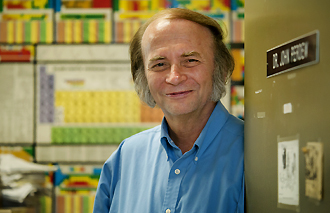Physics professor gets top materials theory award
The Materials Research Society awarded Tulane professor John P. Perdew the Materials Theory Award for his “pioneering contributions to the fundamental development and nonempirical approximations in density functional theory” on Wednesday (Nov. 28) at the organization's fall meeting in Boston.

Physics professor John P. Perdew has been honored for his pioneering contributions to the fundamental development and nonempirical approximations in density functional theory. (Photo by Paula Burch-Celentano)
Perdew presented a talk, “Climbing the Ladder of Density Functional Approximations” earlier in the week.
Perdew's research in the density functional theory of electronic structure has helped to establish it as the most widely used method to predict the properties of atoms, molecules and solids from the principles of quantum mechanics.
A member of the Tulane Department of Physics faculty since 1977, Perdew was promoted to full professor in 1982. At Tulane, he served two terms as chair of physics, and has supervised the research of 15 doctoral students and 12 postdoctoral research associates. His research group currently includes two undergraduates, three graduate students, one postdoc and two research assistant professors.
His research has been supported by the National Science Foundation since 1978. Perdew's honors include election to the International Academy of Molecular Sciences and the National Academy of Sciences. He is also a fellow of the American Physical Society and has more than 260 publications.
The Materials Research Society is an international organization of almost 16,000 materials researchers from academia, industry and government, and a leader in promoting the advancement of interdisciplinary materials research to improve the quality of life.
